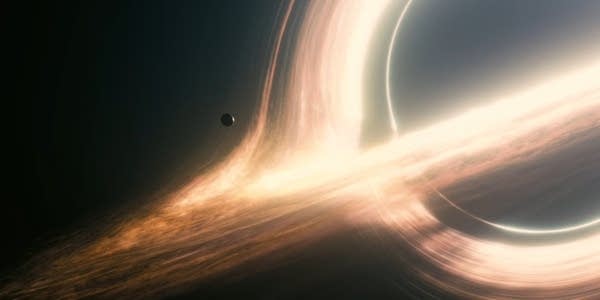In the 20th century, the sound of outer space was defined by Gustav Holst, Richard Strauss, and John Williams. Stanley Kubrick's use of the classical repertoire for 2001: A Space Odyssey (1968) taught viewers to associate space with both the classic sound of the orchestra and the dissonant clangor of the mid-century avant-garde. In his score for Star Wars (1968), John Williams updated Holst — and Korngold — for a new generation of sweeping space opera.
In the 21st century, composers and sound designers are redefining the sound of space in a way that's mindful of the fact that there is no sound in space. Increasingly, films set in space take that absence into account — using minimal sound effects and paying close attention to detail in the sounds heard inside space suits and space ships, with complementary music throughout.
Dissonance, bombast, or lyrical melodies: what connects all of these musical approaches is awe. We are dumbstruck by space and its overwhelming presence; any film about "space" tends to take this into account.
With Christopher Nolan's Interstellar now appearing on movie screens everywhere, it's a good time to survey this evolution and celebrate the creativity of composers writing film scores today. Here are some of the landmark space-themed film scores of the century so far.
Le Voyage Dans La Lune (A Trip to the Moon)
Georges Melies's 1902 silent space-exploration film had a high-profile score created by Air in 2012 to accompany the release of a rare colorized version that had been discovered in 1993 and tediously restored. It's a curious take that speaks more to the film's continued relevance throughout the ages, as space and time have transformed how we listen, as well as a testament to the power of music to change the way we view things. It's very much a pop record a la Air, put to a cinema classic.
Solaris
The score for Steven Soderbergh's 2002 adaptation of the 1961 Stanislaw Lem novel — a novel also adapted by Russian filmmaker Andrei Tarkovsky in a classic 1972 movie — was written by Cliff Martinez. It's a benchmark that really launched Martinez into a whole new realm of respect for the way his music was able to not only present the awe of space, but the complexities of the relationships experienced by George Clooney's character. Using lots of bells and their resonance as texture, very rarely has a film's score so successfully captured the depth of a narrative.
Sunshine
This often-forgotten 2007 film by Danny Boyle's is one of the better space films of the last ten years and works really well — until the third act when it decides it's an overt horror film. Heavy on sound effects, especially outside the ship, it does use music effectively in a music-video kind of way that carries its themes. Propelled by the music of John Murphy and the band Underworld it's more of a pop score, in keeping with Boyle's other efforts, but it's a new way to capture the energy of outer-space action.
Gravity
The big space ticket of 2013, Alfonso Cuaron's film is notable for trying to actually recognize the absence of sound by only utilizing sound from inside the suits or when the characters are in a spaceship (much like Joss Whedon did with his show Firefly) and then having the score by Steven Price fill in the space. It's an impressive achievement that also allows for the terror of seeing big explosions absent sound — you realize how much sound grounds you in the moment, and how foreign the silence of space really feels.
Moon
Lastly, Moon. Duncan Jones's first feature allowed him to start forging a creative identity of his own rather than always being in the shadow of his father — David Bowie. It's heavy on music, utilizing the skill of composer Clint Mansell to create a heavily atmospheric and driving feel. As in Sunshine or the Alien series, it has lots of air and metallic sounds that reinforce the over-arching claustrophobia of these films. As Alien's tagline famously noted, in space no one can hear you scream.
Garrett Tiedemann is a writer, filmmaker and composer who owns the multimedia lab CyNar Pictures and its record label American Residue Records.
Love the music?
Show your support by making a gift to YourClassical.
Each day, we’re here for you with thoughtful streams that set the tone for your day – not to mention the stories and programs that inspire you to new discovery and help you explore the music you love.
YourClassical is available for free, because we are listener-supported public media. Take a moment to make your gift today.


